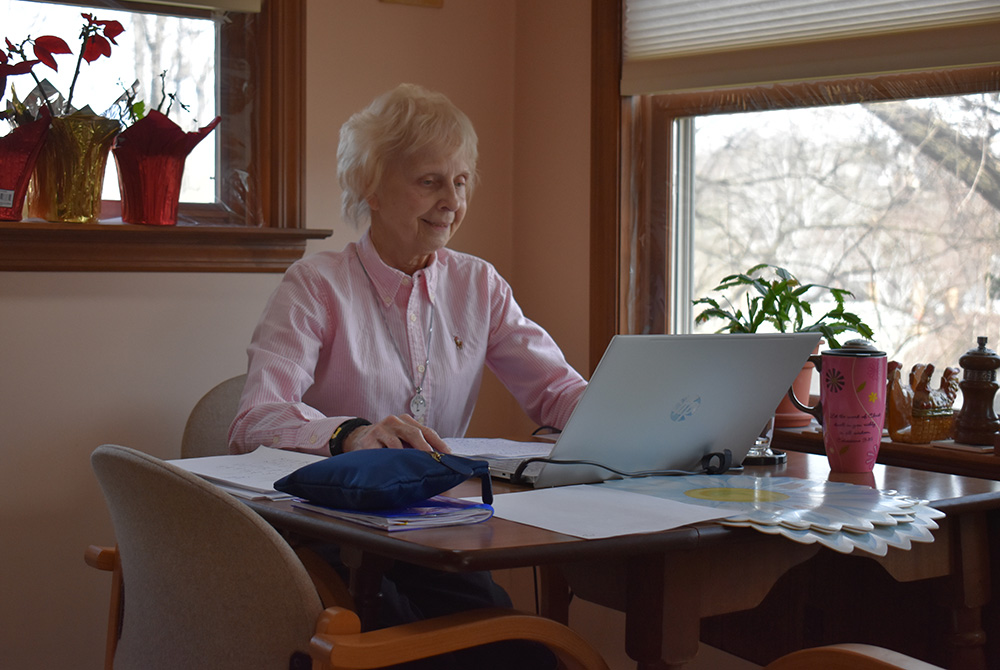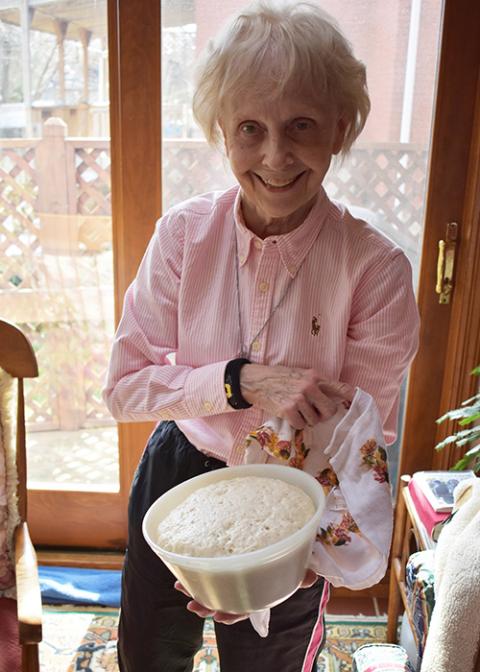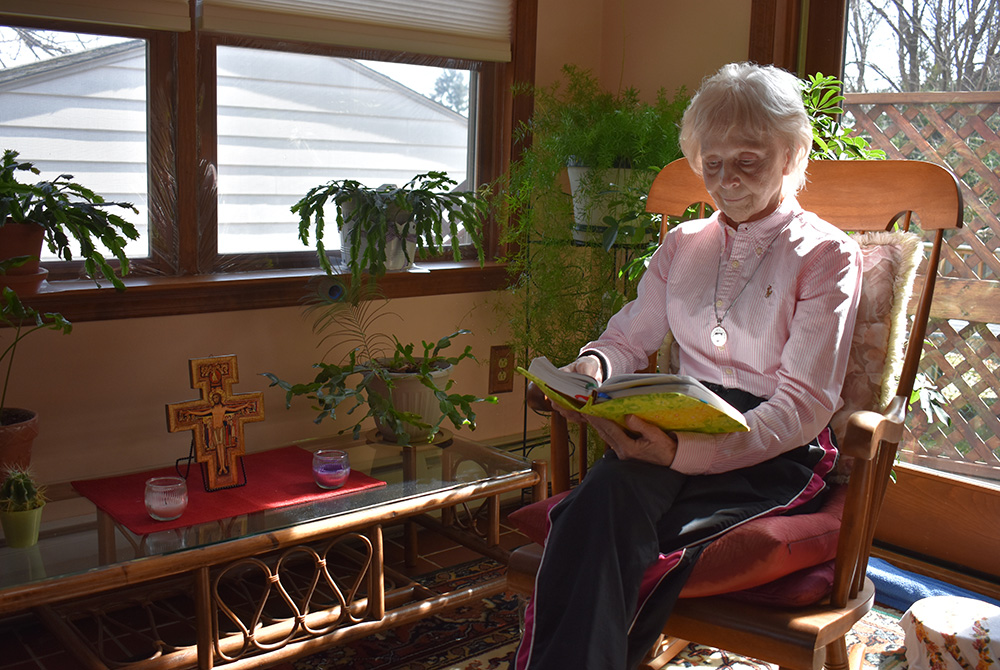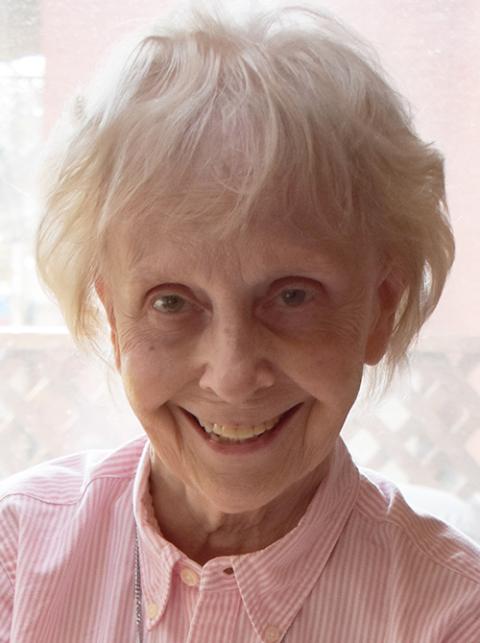
Sr. Suzanne Susany of the Sisters of St. Francis of the Neumann Communities assists immigrants from home in Pittsburgh during the pandemic. (Julie A. Ferraro)
For decades, Sr. Suzanne Susany of the Sisters of St. Francis of the Neumann Communities ministered with immigrants in a parish setting. Inspired by her interactions and the needs of the people, she headed in a new direction in 2006: Then in her 60s, she enrolled in law school to become an immigration attorney.
She earned a bachelor's degree in theology years earlier at Mount Mercy College, now Carlow University, in Pittsburgh after professing her vows with the Sisters of St. Francis of Millvale, one of the communities that formed the Sisters of St. Francis of the Neumann Communities in the early 2000s.
After serving briefly as a teacher, Susany traveled to Puerto Rico, where she learned Spanish while working with women in initial formation. When the time came for her to transfer to a new assignment, Susany knew she wanted to use Spanish in her ministry.
Six years in Lorain, Ohio, at Sacred Heart Chapel presented Susany with the opportunity to work with Puerto Rican families, including second and third generations, blending both Spanish and English.
"It was a very dynamic parish ministry," she said.
At her next assignment in Georgia, Susany began working with immigrants, documented and undocumented. She attended traffic court with them to serve as translator during hearings on violations and assisted with medical situations and school issues.

Sr. Suzanne Susany of the Sisters of St. Francis of the Neumann Communities likes to make homemade bread, letting the dough rise before baking. (Julie A. Ferraro)
Three years later, Susany moved north to Ashtabula, Ohio, to help form a Hispanic community. Beyond her religious education and sacramental ministries, she provided assistance with courts, school attendance and grades, and hospitals. She also dealt with border patrol agents with the city, located on the shores of Lake Erie.
At the end of that six years, Sr. Ann Carville, the last superior of the Sisters of St. Francis of Millvale before they joined the Neumann Communities, asked Susany a life-changing question: "Did you ever think of getting a law degree?"
Susany attended law school at Duquesne University, Pittsburgh, her first choice. Her mother was still alive at the time, and Susany wished to be close at hand.
Susany counts her graduation from law school in 2010 as one of the miracles in her life. Another miracle that same year: "I passed the bar."
Since then, from a tiny office provided by the Community Justice Project in Pittsburgh, she has focused on helping immigrants and asylees, especially women, navigate the complex system to gain legal status and citizenship. Over 50 years a Franciscan, she lives with three other sisters at the Dwelling Place convent, making bread when time permits and commuting via public transportation.
GSR: What was the biggest challenge in your return to college to study law?
Susany: The interesting thing is, at that time at Duquesne, they did not have an immigration clinic. I think they're attempting to do something toward that. I really was clear that was what I wanted to do, and they offered only one course, so I took that course.
I was very fortunate for my two summers. Between the first and second year and the second and third, I worked clerking at the Community Justice Project, a class-action, pro bono civil rights group. They worked primarily with some education issues in Pennsylvania, tenancy, even with the Adam Walsh Child Protection and Safety Act, dealing with sex offenders. They had a Spanish-speaking paralegal who was working actively in the Spanish-speaking community, and I did some work with him.
For years, I'd worked in parish ministry. In parish ministry, you have a kind of mindset: nonjudgmental, working to help, to see the best in people. It's a personalism approach: You deal with each person where they are. Then you come to law, and law isn't like that. The law is the law. It's just a different whole perspective from what you're doing. We are trained, in church work and as Franciscans, to try to see Christ present in each person, and that doesn't count in the law.
I didn't have any trouble being with younger people. I enjoyed them. They probably looked at me like, "Oh, Grandma, what are you doing here?" But they were very respectful. I really enjoyed my law school time, but it was a lot of work. I probably did more work than some of the other students because I actually read a lot of the cases. Most of them had notes they got from somebody.

Sr. Suzanne Susany of the Sisters of St. Francis of the Neumann Communities prays in the prayer room at the Dwelling Place convent in Pittsburgh. (Julie A. Ferraro)
How is working as an immigration attorney a fulfillment of your call to be Franciscan?
The people I work with are mostly low income. I do a lot of asylum cases. The people come, and they're asking for asylum. Believe me, they don't have a lot with them. They are starting here, most of the time, with nothing. Some of them, if they're lucky, come over and tap into jobs that they have skills for, but not many. To do that, you really need to come in on a visa.
All of the Central Americans, they come without visas. Those that come with a visa, they have nothing here.

Sr. Suzanne Susany of the Sisters of St. Francis of the Neumann Communities (Julie A. Ferraro)
Often, the education they have is not useful here. What kind of jobs are open for women? Look at the disparity that women have who are citizens. They talk about the glass ceiling, and it exists. Secondly, among women, if you're Black, you're also less.
I do pro bono and reduced-fee work. I tell my clients, "This is how much it will cost." Then I tell them, especially the asylees, "Pay what you can when you can." I remember one lady who I charged a reduced fee took four years to pay. She would bring me $35 here or $20 there. Little by little, she finally paid it off.
What are the biggest challenges for female immigrants when coming to the United States?
The whole idea of becoming vocal to advocate for yourself, which includes education, is a big challenge. I've worked with a number of immigrants who are actually illiterate. One woman, a mother, worked herself up from being a hotel cleaner to being the person who scheduled the housekeeping crews on the computer, even though she was illiterate.
These women are intelligent. They work for what they earn, they are intentional, but they were never able to go to school beyond the second grade, and school is not like it is here. They have no books.
Women, in many places, are devalued. It's like: Well, the boys have to go to school, but the girls can stay home and clean the house, because the mother a lot of time is earning for the family, so who's going to take care of the house, do the wash, do the cooking? The little 6-year-old.
Advertisement
What programs would you like to see expanded or created to help female immigrants fulfill their potential in the United States?
I'd like to see programs that would help female immigrants with education. There are some that are available, but the problem is the timing. These are women who have to take care of the house, the kids; most of the time, they work while the kids are in school. Then, when they get home, they have to prepare the meals, care for the kids, clean the house, do the wash, and do the shopping. By and large, it all falls on women.
People who might be willing to help the women get their Social Security cards after they have their work permit are vital. They're supposed to get their Social Security card when they get the work permit, but they need Social Security cards for their kids. And I'm talking about people who have status. I have one mother that's been trying to do that for two years. With COVID-19, there's no way to go in.
Helping women navigate the language and the culture is really, really important. Groups that will help the women know they can speak out: "Yes, you have a right. Yes, you can ask for this. You have a right to advocate for your kids. You have a right to ask for running water. You have a right to ask that repairs be done in the house."





